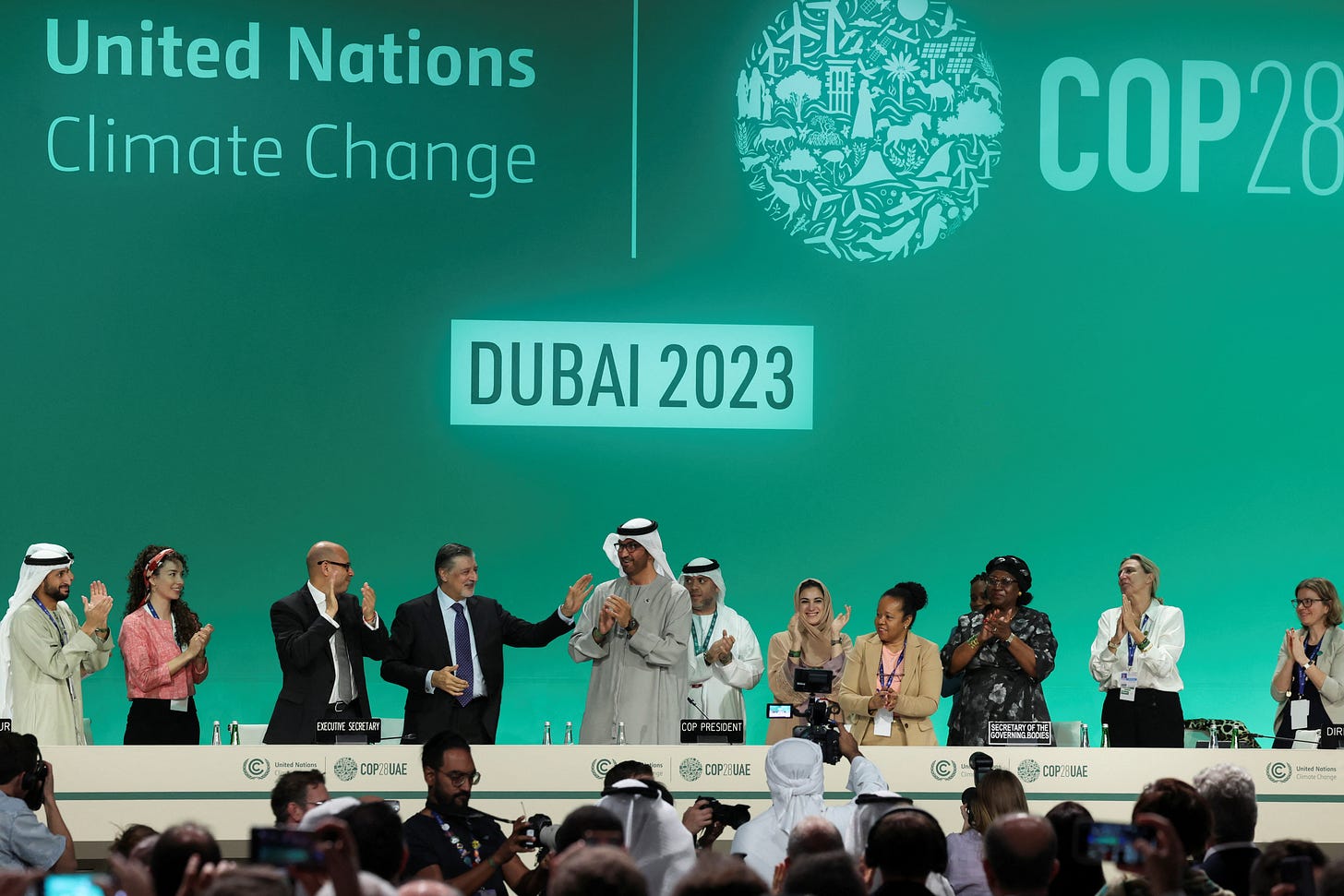Issue No. 150
Welcome to the latest issue of Carbon Creed - a curated newsletter for the carbon-minded reader.
Happy holidays!
(source: Sean Gallup)
The COP Conundrum: Pledges
On January 20, 2021, President Joe Biden made good on an early pledge by signing an executive order to have the United States rejoin the Paris climate agreement, the largest international effort to curb climate change.
The U.S. played a large role in creating the 2015 agreement, which aims to avoid the most catastrophic climate change scenarios by keeping average global temperatures from rising no more than two degrees Celsius and preferably less than 1.5 degrees Celsius, compared to pre-industrial times, by 2100.
In the three decades since the launch of the United Nations Framework Convention on Climate Change (UNFCCC), the Conference of the Parties to the Convention (COP) has convened member countries every year to discuss how to limit and prepare for future climate change. 195 Parties out of 198 Parties to the Convention are Parties to the Paris Agreement (COP21).
Climate change is a systemic problem, fueled by eight billion human souls all engaged in the global hydrocarbon economy. It is a planetary-scale threat and as such, requires planetary-scale action. Governments and Corporations created this problem, and both must be held accountable for a solution.
In my book The Carbon Creed, Accountability is listed as one of the seven pathways to achieving sustainable decarbonization. The accountability creed emphasizes that while individual consumer choices are important, governments and companies are ultimately responsible for the scale of greenhouse gas emissions and the impacts on human health and society.
The recent COP28 pledge to “phase out” fossil fuels is a real conundrum because like most COP agreements, it soars with aspiration but involves little to no accountability.
Keep this thought in mind as you consider today’s feature.
If you have an opinion on any topic covered in this newsletter, please feel free to send me an email at mcleodwl@carboncreed.com.
Thank you for your viewpoint and the value of your time.
FEATURE
(source: Amr Alfiky)
Accountability: COP28 and 1.5 degrees
If you’ve followed any news on climate change in the last decade or so, you’ve likely seen the figure 1.5 degrees Celsius thrown around a lot.
So when Sultan Ahmed Al Jaber banged his gavel on the resolution text of COP28 in Dubai on Wednesday, December 13, 2023,, it marked what has been widely called a historic achievement: the first time nearly every country on Earth agreed that oil and gas play a role in driving global warming, and the first time they nodded toward the need for a fossil fuel drawdown.
The timing certainly seems right. Global sales of internal-combustion engine vehicles peaked in 2017. Investment in renewable energy has exceeded investment in fossil fuel infrastructure for several years running now. In 2022, 83 percent of new global energy capacity was green. The question isn’t about whether there will be a transition, but how fast, global and thorough it will be.
The climate “North Star”
“Every decision we make should be geared to say, ‘Does this advance the 1.5 degrees or is it going to be more destructive and take us in the wrong direction?’” U.S. Special Climate Envoy John Kerry, calling the figure our “North Star.”
Referring to the Paris Agreement’s target of keeping Earth from warming no more than 1.5 degrees Celsius since the Industrial Revolution, the number has become a rallying cry for climate advocates and scientists, who say the goal is humanity’s best bet on avoiding the most catastrophic outcomes of climate change by the end of the century. Venturing even 0.5 degrees past that threshold could drastically increase the frequency and severity of extreme weather, biodiversity loss, famine and water scarcity, as well as make it more likely that tipping points accelerate warming further, climate scientists say.
But out of the public’s eye, many top climate diplomats and leading scientists have believed for years that the chance of achieving 1.5 degrees of warming is slim to nothing. The planet has already warmed about 1.3 degrees, and a growing number of researchers and thought leaders in the climate movement are now stating that belief bluntly as negotiations begin in earnest at the U.N. climate conference.
To limit warming to 1.5 degrees Celsius now requires entirely eliminating emissions not long after 2040, according to the Global Carbon Project, whose “carbon budget” for 1.5 degrees Celsius will be exhausted in about five years of current levels of emissions. For 1.7 degrees Celsius, it’s just after 2050, and for 2 degrees Celsius, 2080.
And despite Al Jaber’s claim that COP28 has kept the 1.5 degree goal alive, most analysts predict a global peak in fossil fuel emissions at some point over the next decade, followed not by a decline but a long plateau — meaning that, every year for the foreseeable future, absolute greenhouse gases emissions will not decline. The expected result: end-of-century warming between 2 and 3 degrees Celsius.
Keeping (1.5 degrees) hope alive!
Over the last several years, as decarbonization has made worst case scenarios seem much less likely, a wave of climate alarmism has given way somewhat to a new mix of optimism and adaptation.
For example, at this year’s COP, Bill Gates described anything below 3 degrees as a “fortunate” outcome. A few months earlier, former President Barack Obama struck a similar note in a YouTube interview with Hasan Minhaj, describing how he’d tried to talk his daughter Malia off the edge of climate despair by emphasizing what could still be saved rather than what had been lost already through global inaction: “We may not be able to cap temperature rise to 2 degrees Centigrade, but here’s the thing, if we work really hard, we may be able to cap it at two and a half.” In an upbeat polemic to be published next month, the Scottish data scientist Hannah Ritchie gives a kind of stiff-arm to those caught in a panic about warming and environmental degradation; the book is called “Not the End of the World.”
As we find ourselves now adjusting to the possibility of a future shaped by temperature rise of 2-3 degrees, it may be clarifying to recall that, almost certainly, when you first heard those projections, you were horrified. The era of climate reckoning has been, to some degree, a period of normalization, and while there are surely reasons to move past apocalyptic politics toward something more pragmatic, one cost is a loss of perspective at negotiated, technocratic events like the recent COP28.
[This post was adapted from articles written by David Wallace-Wells (NYT) and Kristoffer Tigue (ICN)]
Creed Thoughts
The Paris Climate Agreement reached its eight-year anniversary in 2023, and while it gets lots of praise for advancing the climate agenda, the actual results have been mixed. It is probably better to describe the Paris Agreement as “a work in process.” The agreement is an unusual hybrid of soaring ambitions with little accountability.
Nearly every country in the world signed onto a “pledge” to take steps to keep global temperature increases “well below” 2°C by 2100. Doing so would require decarbonizing the energy and transportation sectors, halting the loss of forests, overhauling food production, and finding ways to suck greenhouse gases out of the atmosphere. Yet to meet the overall goal, countries were allowed to come up with their own goals and plans for how to accomplish them. Falling short comes with few concrete penalties. This penalty-free model removes all accountability, and is a flaw that needs to be corrected. I have an idea.
While government officials may be sincere when making these carbon vows, they aren’t always faithful. That’s because leadership can change frequently, and with changing government comes broken vows. Government is much better suited for creating the policy incentives necessary to decarbonize our economies. I believe there are three immediate policy imperatives that all sovereign governments should enact, and corporate sectors should embrace, if they intend to keep their carbon vows (zero carbon pledges):
adopt a carbon fee and dividend
decarbonize the grid
electrify transportation
If you want to learn more about the accountability creed and my policy solutions, check out my book The Carbon Creed,
Cheers!
RESOURCES
The Science of Climate Change Explained: Facts, Evidence and Proof, published by the New York Times
Currents a podcast featuring in-depth discussions with experts on clean energy and sustainability, published by Norton Rose Fulbright.
Matter of Fact, a weekly newsmagazine that focuses on socioeconomic and climate issues in America, hosted by veteran journalist Soledad O'Brien.
Advancing Inclusion Through Clean Energy Jobs a report by the Brookings Institute.
Congressional Policy Tracker a summary of current federal energy legislation.
Click Clean your favorite apps and tech company clean power rankings.
The Keeling Curve a daily record of global atmospheric CO2 concentration.






Dear Sir or Peasant,
“Thank you for joining The Carbon Cult- even if you didn’t know you had”.
Resigning your membership will be about as easy as cancelling that full gym membership you didn’t want and never used.
Welcome to The Great Carbon Con-trol Club
Just as Mediaeval Popes made Galileo prostate himself before their golden throne and deny the truth they knew from Copernicus and Arab and Indian texts they supressed, that the earth orbited the sun.
So, “climate variation” is determined by many factors such 11-year solar cycles and measured in electromagnetic waves of millennia, not primarily by man-made CO2 “emissions”. And certainly not from a Hyundai i10 being driven by a bald man called “Reg” to a Lidl in Luton.
But why let the mere truth get in the way of a convenient orthodoxy.
The public are not told about the patterns by which global temperatures warm, and then carbon dioxide concentration rises. Nor the saturation of layers of the upper atmosphere which is inconveniently cooling the earth.
Which info-boggled Gen-Z can remember the coming of the “New Ice Age by 2001” predicted by “experts” in the 1960’s. Just keep scrolling the personalised News Feed till you find the truth you like.
As in 1633, drunk on power, the elites and the well-meaning know well, the Smartphone Bible-clasping peasants think they are beyond such deceit and ignorance.
They do not have time, nor are given the education, to “Do Complexity”.
The pointless as it is counterproductive pursuit of “Net Zero”, “Carbon Trading” and CO2 Emissions is, like the Con-vid Scamdemic, another Faux-Crisis we will never learn from.
It is global Groupthink. Political, a surrogate religion. The Carbon Cult. Whatever it is, it is not Science.
Carbon, unlike water vapour and methane, is easily measured. And if you measure you can Tax. Tax and you Control. So, in 1973, Rockefeller Commissions decreed to the UN that “Carbon” had been chosen. The new Carbon cult was born- before The Problem was created.
Used by the same self-perpetuating and unelected elites obsessed with controlling the populous, via artificial economic, tax and legal restraints and most cleverly of all, the sugary psychology of self-enforced social conformity.
There is no scientific “consensus”. (See Cook Report, Heartland Institute, Willie Soon et al).
You can buy the “Science”, as you can polls and public opinion.
Same superstition. Same heresy. Same power.
Drown the witches in Information.
Now the Golden Throne is social media and “public opinion”.
The only real “evidence”, the “proof”, is that you can fool all the people all the time.
That the rich will get richer- and freer- and the poor poorer.
Ever more confined by the sackcloth and ashes they love to smear over themselves. Even as they chant the self-flagellating Carbon Creed, promising not to drive more than 15 miles from home and eat their daily penance of Protein Insect Rice.
“I Believe, O Carbon-Neutral Lord, Save The Planet” …